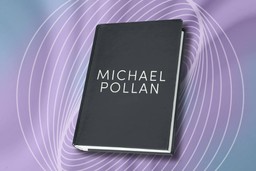Michael Pollan’s books on psychedelics come out of his career as an author, journalist, and Knight Professor of Science and Environmental Journalism at the UC Berkeley Graduate School of Journalism. His earlier works centered around botany and food, with titles like Cooked: A Natural History of Transformation. In 2018, he released his first book focused on psychedelics. Since then, he has released another book and Netflix documentary, the product of his hands-on investigative research with psychedelics.
Follow your Curiosity
Sign up to receive our free psychedelic courses, 45 page eBook, and special offers delivered to your inbox.Who Is Michael Pollan?
Michael Pollan is a journalist, author, and professor. Many of his works explore the socio-cultural impacts of food. Though his B.A. and M.A. are in English, he is strongly interested in plants. His study of botany crossed over from food to psychedelics in 2018 when he released How to Change Your Mind: What the New Science of Psychedelics Teaches Us About Consciousness, Dying, Addiction, Depression, and Transcendence.
How to Change Your Mind
How to Change Your Mind: What the New Science of Psychedelics Teaches Us About Consciousness, Dying, Addiction, Depression, and Transcendence, was the first of Michael Pollan’s books on psychedelics and his first experience with psychedelics. Since then, he has become a supportive force in the world of psychedelia. His studies have always investigated how plants humans eat can affect and benefit the body. Hence, plants that can cause psychedelic effects when ingested were a natural next step.
With How to Change Your Mind, Pollan set out to investigate how psychedelics, namely LSD and psilocybin, are currently being researched for treating conditions like depression and anxiety. His research showed that not only sufferers of mental health conditions are also using psychedelics. Healthy individuals may turn to these substances, too, in order to deal with the stresses of everyday life. After detailing the history of psychedelics and how they got a bad rap in the 1960s, he turned to hands-on research, experimenting with LSD and psilocybin under the care of guides who supervised the experience and arranged the setting.
Pollan’s first work on psychedelics became a sort of “mental travelogue” that is part investigative journalism, part history and science, and part memoir. It focuses on not only psychedelic drugs but also the human mind and consciousness. His book became a supporting voice for psychedelic use as it started to sift through past propaganda and portray how today, psychedelics can treat mental illness instead of simply recreational party drugs. Helping psychedelics shed their dangerous and reckless persona to become drugs that can be used for healing.
This is Your Mind on Plants
Another of Michael Pollan’s books on psychedelics, This Is Your Mind on Plants, released in 2021, Pollan looks at other psychedelics. Primarily opium, caffeine, and mescaline. Where the first book kicked off the psychedelic field, his second book strives to have a conversation about the post-war on drugs era, namely, how drugs can be differentiated from one another, each having benefits, additionally how drugs can be used safely and effectively and have been by certain cultures for many years.
Again, Pollan engaged in firsthand research, ingesting opium, caffeine, and mescaline. He states that he also tried MDMA, though he does not write about it in his book. Pollan believes that the psychiatry field is interested in psychedelics as new tools for treating mental health conditions. Similarly, the religious use of psychedelics is growing, where the substances are called entheogens. He writes about the mysticism and spirituality of psychedelics and how they can help individuals reach a new plane of consciousness. As a proponent of psychedelics for helping humans solve the puzzle of human consciousness, his book attempts to ask vital questions about psychedelics and challenge the public’s feelings towards them, fostering a renaissance of these substances not only for mental health disorders but for to feel the spiritual power and sacredness of a “trip.”
Instead of viewing them only as a drug, he questions how humans can use psychoactive plants to change their consciousness and alter their mental experience. He argues that society has long had anxieties towards many of these substances, when in fact, most of them are non-addictive and don’t come with the “physiological noise,” Pollan’s term for the distraction and disruption of the human body’s communication processes, that is common with other psychoactive drugs. He isn’t advocating for the recreational use of the drugs but their use as treatment when utilized by trained professionals.
The UC Berkeley Center for the Science of Psychedelics
In 2020, Pollan co-founded the UC Berkeley Center for the Science of Psychedelics. The center researches how psychedelics can alter and treat cognition, emotion, and perception. Other founders include neuroscientist David Presti and psychologist Dacher Keltner. Research at the center will be similar to and benefit further research focusing on how psilocybin and other psychedelics can be used in combination with psychotherapy for mental conditions like depression, anxiety, and PTSD.
The center also awards $10,000 grants through the Ferriss-UC Berkeley Journalism Fellowships program for audio and written stories surrounding topics of psychedelic science, policy, and culture. The grants are “to establish and nurture a new generation of journalists covering the front lines of this rapidly changing field.”
Netflix Series: How To Change Your Mind
The second of Michael Pollan’s books on psychedelics, How To Change Your Mind, was made into a Netflix series in 2022. The docuseries explores the historical uses of psychoactive plant compounds like psychedelics, including LSD, psilocybin, MDMA, and mescaline. But it also details their possible therapeutic uses through conversations with researchers, activists, therapists, and those treated with psychedelics. Like his books, the series hopes to change society’s perspective on these substances.
Nevertheless, Pollan strongly encourages anyone considering psychedelics to do so with caution as there is a certain risk factor. Many of them are best used in a guided manner under the supervision of an experienced individual. Pollan himself was a “reluctant psychonaut,” but today, through his works, he makes a convincing case for the healing properties of psychoactive plants.







